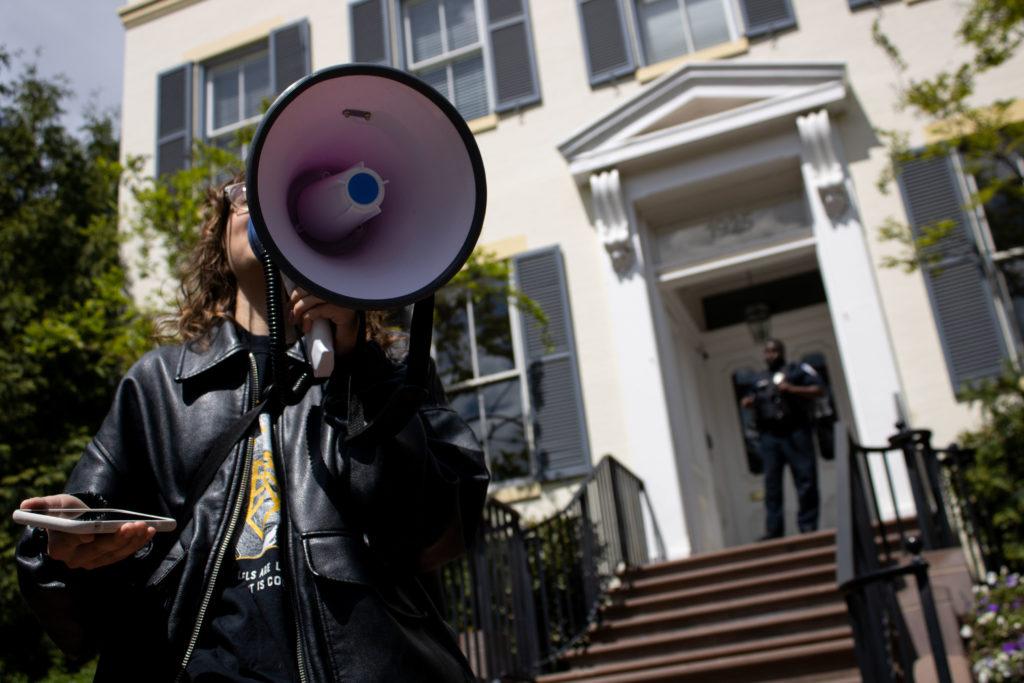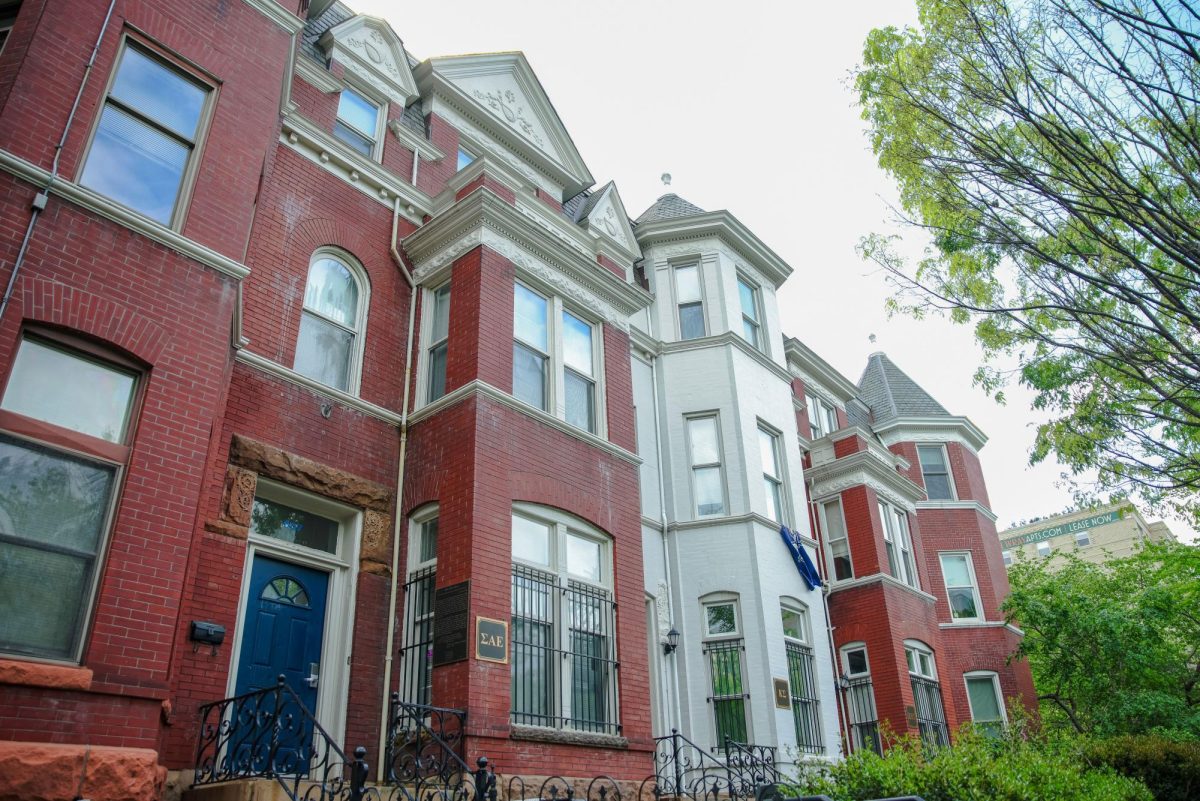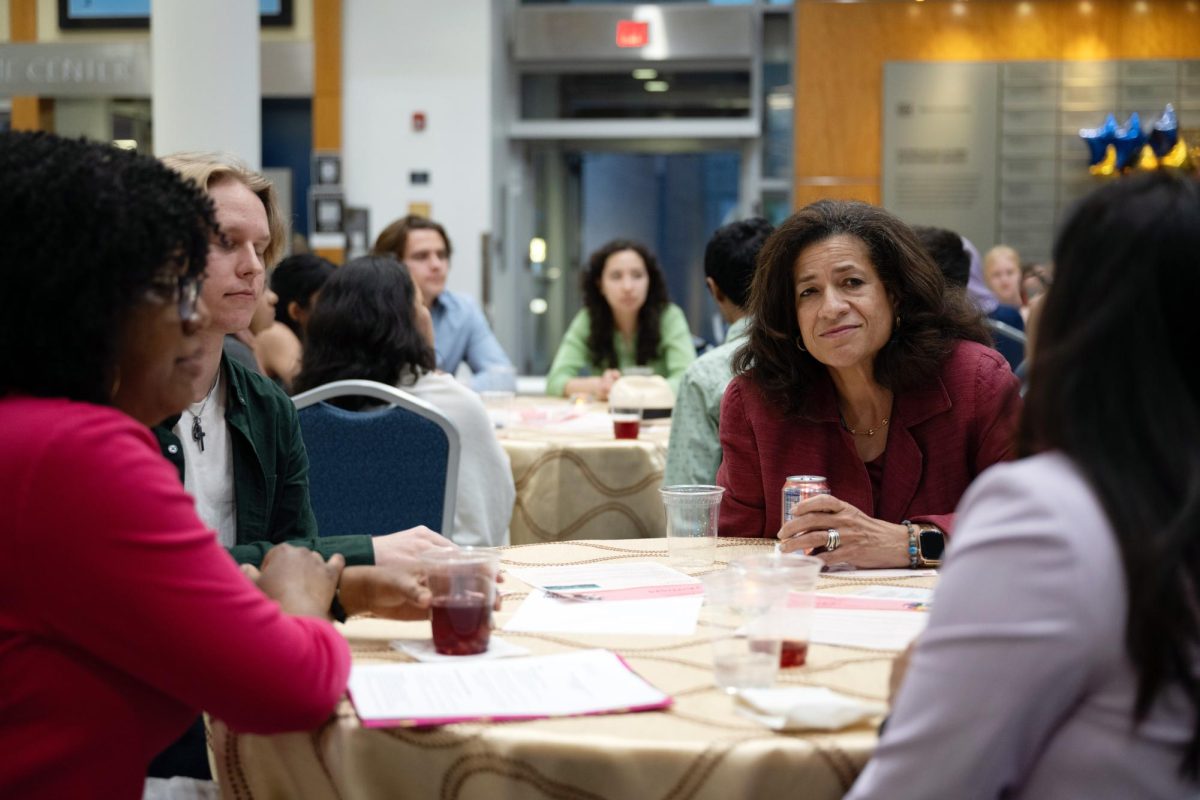Students have pushed back against the University’s plans to arm GW Police Department officers with demands for the Board of Trustees to reverse a decision they say will endanger campus and lacked sufficient community input.
The announcement that GWPD will arm about 20 officers with handguns next fall has raised concerns among students that the move will increase the rate of violent encounters at the hands of GWPD officers, especially toward Black and brown students. GWPD Chief James Tate said he discussed the decision with the Student Association, the Black Student Union and Fraternity and Sorority Life leaders before the announcement, and while some students he consulted said the move can expedite the police response to shootings on campus, nearly 750 people have signed a petition as of Sunday night claiming the move will “escalate conflicts.”
Last Monday, more than 150 students marched from Kogan Plaza to F Street House, interim University President Mark Wrighton’s on-campus residence, to protest the decision. In interviews, half a dozen students said arming officers will equip GWPD officers to respond to incidents involving firearms around campus and improve local security, but 30 students said the officers will pose serious risks to campus safety.
BSU President Gianna Cook and Executive Vice President Drew Dodd said Tate sought their input on Black students’ potential reaction to arming GWPD officers while the Board was deliberating the decision. Cook said Black students have “mixed” views on the announcement depending on their interactions with officers on and off campus.
“We basically let him know the nuance that this is not at all going to be a black-and-white situation,” she said.
Cook said after she was elected to her first of two terms as BSU president in 2021, she spoke with Tate about “rumblings” of potentially arming officers in the future, and Tate sought her and Dodd’s opinion on the matter this semester once the Board started considering the move. Cook said before Tate assumed his role as chief in early 2020, GWPD officers were “over-policing” campus and stationed in residence halls, which caused “fear” in the Black community at GW and made her hesitant about arming officers when Tate first mentioned the idea.
After joining the department, Tate implemented a series of reforms centered around community relations and transparency, rolling out body-worn cameras and bias and de-escalation training in August 2020 and introducing community outreach events starting last fall, like monthly “Coffee with the Chief” meetings with students.
Cook said increased criminal activity on campus and nationwide school shootings became the “key definer” behind her support for the decision to arm officers.
Wrighton said the Board decided to arm GWPD officers in response to a rise in nationwide gun violence, including mass shootings on college campuses like those at the University of Virginia in November and Michigan State University in February. The shooting at UVA killed three students and injured two, and the MSU shooting killed three students and injured five.
“I didn’t want it to be said that we waited until it was too late to arm our officers,” Cook said. “I didn’t want a student to be harmed or anyone on our campus to be harmed.”
Cook said unarmed officers cannot respond to on-campus crimes because officers’ de-escalation tactics are “vastly limited” when individuals have firearms. She said students who are troubled with the decision are rightful to feel that way and should discuss their reactions further with GWPD.
“We can wait, wait, wait all we want, but there’s always going to be some hesitancy, some uneasiness with this idea because you would never want to think you’re unsafe,” she said.
She said Tate should hold a public forum with students to share more about the policy before officials implement it in the fall.
“I’m hoping that there are no barriers in place when students want to have that dialogue,” she said.
SA Sen. Lydia Miller, ESIA-U and the chair of the Undergraduate Student Life Committee, said she first spoke to Tate about arming GWPD officers in a discussion with SA President Christian Zidouemba and other SA members in December and met with him one-on-one in late February to discuss instituting a potential task force or town hall to confer about the decision with students. She said she supports the decision to arm some officers because reports of shootings on other college campuses made her question her safety in Foggy Bottom and GWPD officers are trained in firearm use.
Tate said many of the officers who would receive firearms have already been certified to carry firearms from previous positions at other police departments and agencies. He said officers receiving firearms will undergo training on de-escalation, use of force and firearm usage.
“I am confident that GWPD is acting in our best interest,” Miller said in an email. “The GWPD officers are trained professionals in addition to being individually picked; they’re trained to use weapons only in the most dire of scenarios in the defense of those they serve.”
Incoming SA President Arielle Geismar protested the arming decision last Monday, saying it endangers students of color, especially Black and brown students.
“My years of experience in gun violence prevention informs me that guns do not make people safer,” she said at the protest. “It is incredibly important to me that we keep guns off of GW’s campus.”
The executive board of GW College Republicans sent a statement to The Hatchet Tuesday backing the University’s decision because of the expected acceleration of GWPD officers’ response time in potential active-shooter situations to be “as immediate as possible.” College Republicans leaders said officers saved “countless lives” killing an active shooter who killed six people in a Nashville elementary school last month as well as one who killed five in a Louisville bank last week.
“The backlash against the decision primarily comes from the idea that arming police officers and securing the University from external threats makes students more unsafe, when it does quite the opposite,” the executive board said in a statement.
Senior Victoria Freire said when GWPD officers appeared to push her down the front steps of the F Street House during a Sunrise GW protest in February 2020, there were “rumors” GWPD was considering arming its officers. She said after the incident at the February protest, she and her family met with GWPD to discuss the incident, where she requested Tate not arm officers. She said Tate reassured her and her family he would not.
She said “countless” students and alumni reached out to her with their own stories of GWPD allegedly causing physical altercations with them or racially profiling them. She said cases of officer misconduct often occur on a small scale, not at a public protest, putting students of color at increased risk when video evidence is not available.
“It’ll be in these small interactions in the dorms or around campus late at night where there’ll be no evidence that they are overwhelmingly at risk,” she said.
She said GW’s implementation of body-worn cameras and bias and de-escalation training for officers in August 2020 are not “sufficient enough” to restore her faith in GWPD following her experience. She said improving security technology across campus facilities with panic buttons in classrooms and restricted building access to non-GW affiliated individuals are better initiatives than arming officers to protect students because D.C. already experiences heavy policing.
The District has the most police per capita of any city with at least a quarter-million residents, according to FBI data. The Metropolitan Police Department, U.S. Park Police and U.S. Secret Service all respond to incidents in Foggy Bottom.
“They should be addressing that way before resorting to guns to prevent a hypothetical school shooting in probably the most heavily policed area in the country,” she said.
Faith Wardwell, Jennifer Igbonoba, Nikki Ghaemi and Max Porter contributed reporting.









